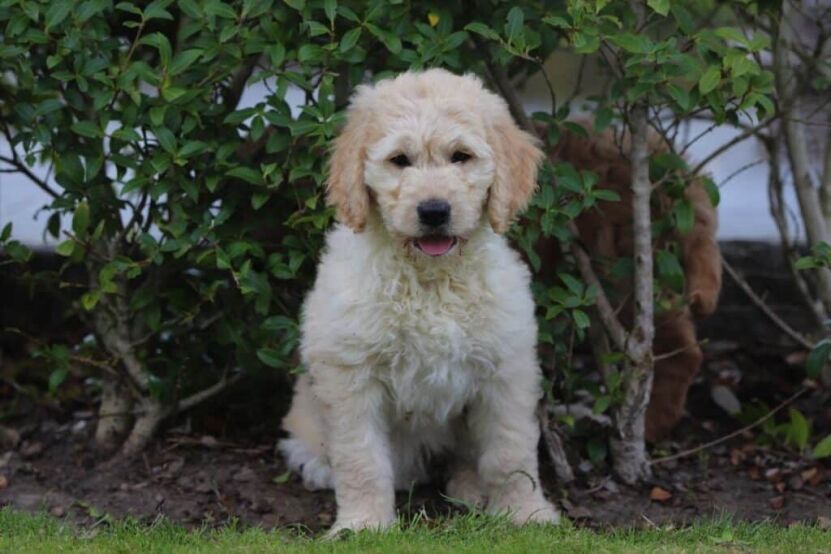Over thirty years ago, Australian Wally Conron bred the very first Labradoodle, therefore also known as Australian Labradoodle, a mix between a Labrador and a Poodle.
The Labradoodle in brief
- Super popular worldwide;
- Because it is a mix, not officially recognised;
- Cheerful, gentle and intelligent in character;
- Often allergy-free due to the poodle influence. But beware: Allergy often comes not only from the hair of the dog but also from dander or saliva;
- They come in three sizes: miniature, medium and standard. The standard is the most popular;
- Also suitable as a guide dog for the blind.

The parents of the Labradoodle
The Labradoodle is a cross between a Labrador and a Poodle. Below, we explain both breeds in detail.
Today, Labradors are first and foremost popular family dogs, but you also often see them as guide dogs for the blind or disabled, search and rescue dogs, or therapy dogs. This versatility is the result of a combination of high intelligence and please behaviour. This breed is easy to train and is almost always enthusiastic, as long as it has to do with people and (sometimes) food.
Poodles are originally hunting and retrieving dogs. They come across as a bit posh, but in essence the Poodle is very athletic and sporty. Just like the Labrador, the Poodle stands out for its intelligence and gentleness. Poodles come in three sizes: the miniature poodle, medium poodle or the royal poodle. Unlike the Labrador, their coat grows continuously, which means they don’t shed much and are a better choice for allergy sufferers. However, they do need to go to the groomer every 6 to 8 weeks to have the coat trimmed, kept clean and free of knots and tangles.
Physical characteristic
Height at Withers: from 43 to 53 cm
Weight: from 15 to 21 kg.
As with almost all mixes, you come across many types of Labradoodles, because in a crossbreed you can never predict exactly which characteristics of which breed will predominate. There is no breed standard for this dog because it is not a breed in itself. In general, you can recognise a Labradoodle by its broad head, more like that of a Labrador than of a Poodle, and well-defined eyebrows.
Unfortunately, it is impossible to know how a puppy will turn out until it is born – such is the case with crossbreeds! So if you are looking for an allergy-friendly dog, make sure you do a skin test before buying and have discussed the matter with the breeder.
Typical Labradoodle: the character
This is where the Doodle excels. Just like their appearance, you can never be entirely sure how the personality of a mix will turn out, but we dare say that Labradoodles are often friendly, affectionate, intelligent and playful. They get along very well with children, and in most cases with other pets as well. Their social character makes them great family dogs. You can put the labradoodle on the lookout just fine but as a guard dog, this friend of everybody’s is of little use.
Labradoodles excel in intelligence and are real sweethearts, so you can teach them just about anything. However, too gentle an approach to these clever sportsmen can be counterproductive.
Beginning groomers can have a tough time raising the Labradoodle. Because of their human orientation, positive reinforcement is the most effective method of education. The use of negative punishment or reinforcement techniques can be detrimental to the training process.
Care of the Labradoodle
Are there also less pleasant sides to a labradoodle? That is certainly the coat maintenance. Puppies with a coat that resembles that of the Labrador lose a lot of hair. You should then brush at least weekly to keep it clean, shiny and free of knots and tangles. During the seasonal shedding periods in spring and autumn, brush every day. If the opposite is the case and your Labradoodle’s coat is more like a poodle’s, it will grow continuously. This means that the coat needs to be trimmed every few weeks. This can be quite expensive.
How old does a Labradoodle become?
The average age expectancy is between 10 and 13 years.
Read our reviews on: https://www.woefkesranch.be/reviews/
Follow us on: https://www.facebook.com/Labradoodlefokker or https://www.instagram.com/woefkesranch/